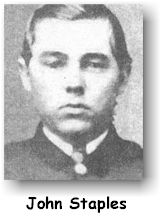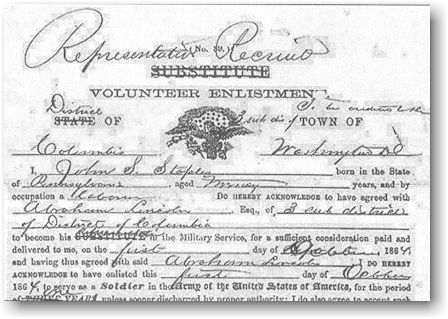Lincoln’s Substitute
By John Lockwood (Washington Times,
12/18/04)
The Lincoln
administration tried several methods of raising recruits during the war -
calling for volunteers, offering bounties, hiring substitutes and, of course,
using the draft. One little-remembered program, however, led to the president
himself finding a soldier for the Army.

The man
Lincoln signed up was John Summerfield Staples.
Lincoln was
prompted to do this by a proclamation from the War Department in June 1864.
The notice
was addressed to those men who were ineligible to serve, and it suggested they
could help the Union cause by encouraging others to enlist. The term
"substitute" did not apply here because the ineligibles weren't going
to be drafted anyway.
As
president, Lincoln was the most prominent ineligible of all, so he decided to
publicize the idea by finding a recruit of his - own. Accordingly, the
president contacted Provost General James B. Fry to find a volunteer.
Back then,
the White House address was considered part of the city's 3rd Ward, so Fry
contacted Noble D. Lamer of the 3rd Ward Draft Club.
Shortly
after, while walking along Pennsylvania Avenue, Larner saw the Rev. John Long
Staples and his son, John, of Stroudsburg, Fa. Larner asked young John if he
would like to serve as Lincoln's recruit, and the young man agreed. His father
had to give his permission, by the way, because young John was less than 21
years old. Shortly after, young Staples met Lincoln, who was well satisfied
with the choice. The new soldier also received an $800 check from the
president, payable at Riggs Bank.
The young
recruit was 5 feet 3 inches tall and described as strong and compactly built.
He was assigned to Company H of the 2nd Regiment, D.C. Infantry.
Oddly
enough, decades later, in the Aug. 28, 1886, issue of Frank Leslie's
Illustrated Newspaper, Larner said his charge “bore the usual reputation given
to minister's sons, and he was naturally a ne'er do well.” As it happened, this
was not Staples' first time in the military.
On Nov. 2,
1862, he had enlisted in Company, C, 176th Pennsylvania Drafted Militia. He had
served as a substitute for Robert A. Berry of Monroe County, Pa.

In early
January 1863, the 176th marched from Suffolk, Va., to Newbern, N.C. By the last
day of
the march,
Pvt. Staples had come down with typhoid; he was ill for several weeks. On May
5, 1863, he had been honorably discharged for health reasons.
Staples
proved more fortunate the second time around, while serving as Lincoln's
recruit. He spent most of his time at Arlington as a clerk to the provost
general and also as a guard at the Prince Street Prison. On one occasion, he
accompanied prisoners being transferred to Columbus, Ohio.
In January
1865, the elder Staples signed up as a chaplain in his son's regiment Young
Staples was again honorably discharged, on Sept 12, 1865.
Father and
son returned home to Stroudsburg to work in the family wheelwright business. In
later years, the younger Staples would work in the shops of assorted railroad
companies.
He died of a
heart attack on Jan. 11, 1888, and was buried in a Stroudsburg cemetery.
Staples was
fairly well-known in his time, sometimes receiving write-ups in the media. In
later years, however, his name slipped into oblivion. In fact, by the early
20th century, many people considered stories about a Lincoln recruit to be a myth,
on a level with George Washington and the cherry tree.
For example,
the Feb. 12, 1911, issue of the D.C. newspaper the Evening Star had article
by a professor Bernard J. Cigrand in which the good professor described his
difficulties in trying to find out anything on the subject. When Cigrand contacted
federal authorities, they “asserted positively that the reported tradition was
entirely without foundation. A letter from the War Department stated
emphatically: ‘It does not appear from the official records of the department
that President Lincoln ever furnished a substitute [sic]!’”
The
professor had to search through the old military records himself and track down
the truth for the Star. Because of the efforts of people such as Cigrand,
Staples was restored to his modest niche in the Lincoln story. There even was
an attempt by Congress in1961 to put up a memorial to Staples in Stroudsburg,
although nothing seems to have come from this effort.
At any rate,
even a modest niche in history is an achievement.
John
Lockwood is a Washington writer.
